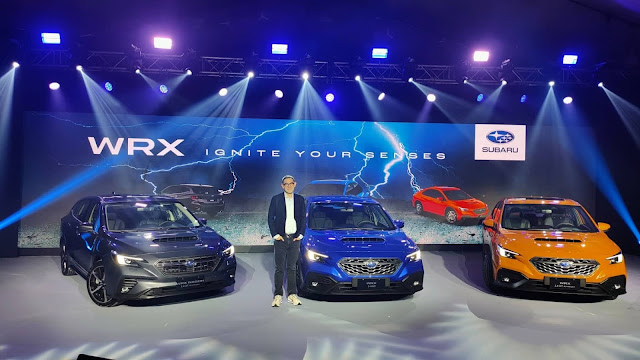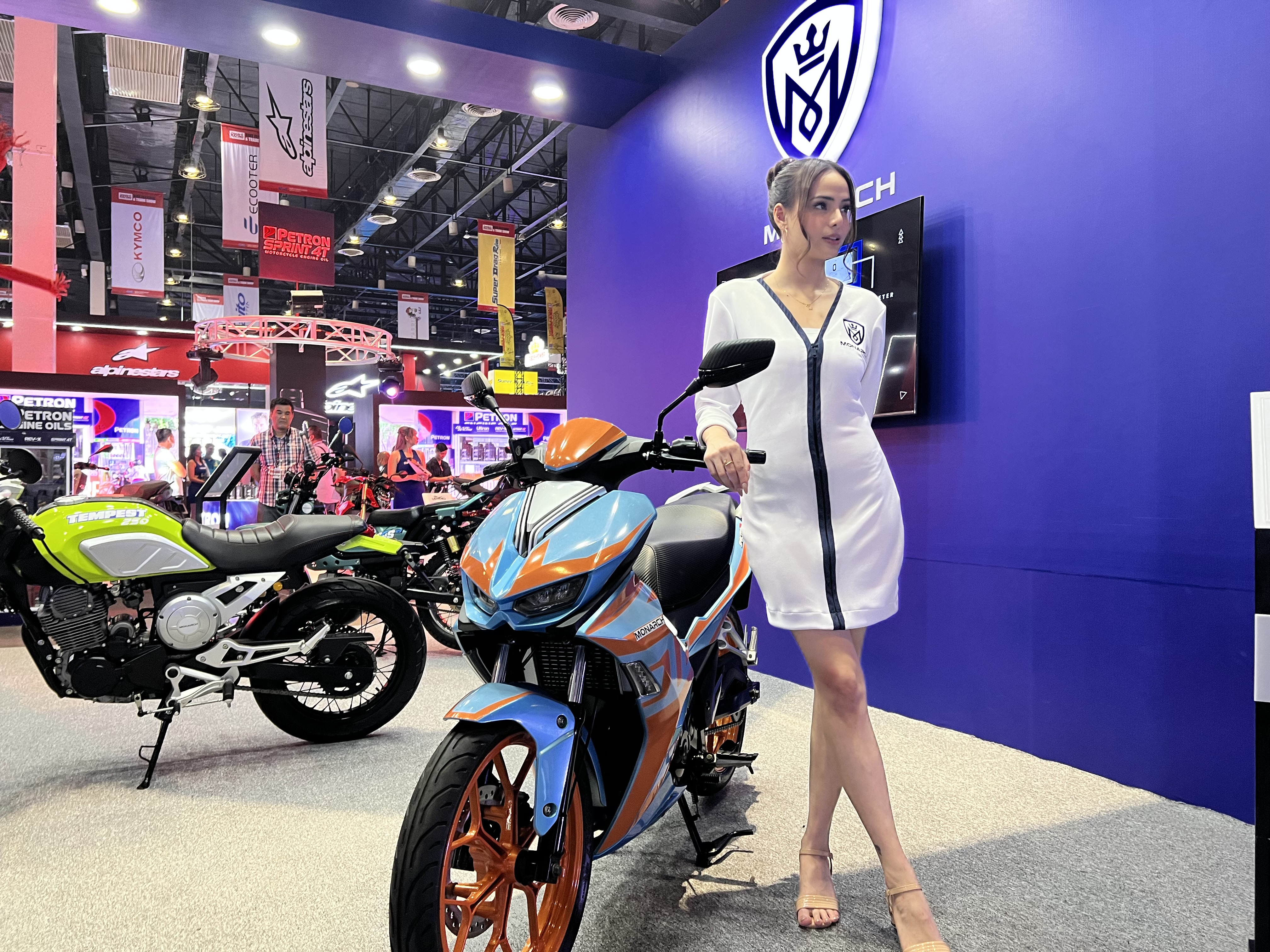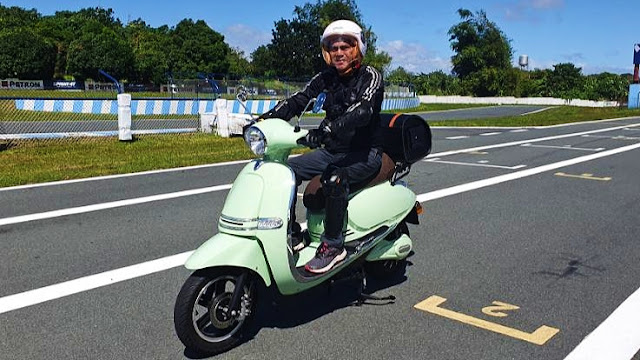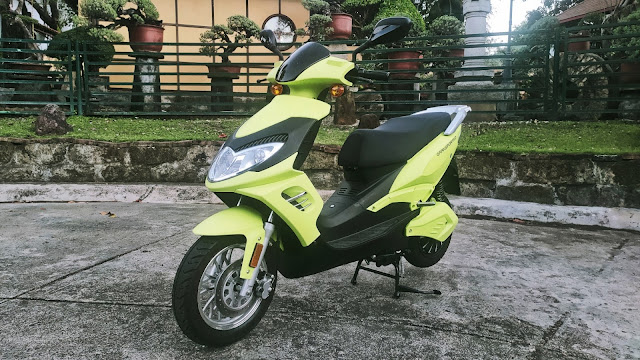Motor Image Pilipinas Launches All-New Fifth-Generation Subaru WRX | Motourismo
The legendary Subaru WRX is back as a new-generation, all-purpose performance car which offers the sporty driving you desire and the practicality you need.
 |
| Motor Image Pilipinas Deputy Chairman and Managing Director Mr. Glenn Tan, presents the Subaru WRX during the launch on June 9, 2022 at Solaire Resorts in Pasay City. |
Motor Image Pilipinas (MIP), the exclusive distributor of Subaru vehicles in the Philippines, is excited to announce the debut of the all-new, fifth-generation Subaru WRX and WRX Wagon today.
Our latest WRX models join the equally fresh second-generation BRZ coupe to make Subaru’s 2022 sports car lineup truly thrilling for petrol heads who wish to drive something special.
Said Mr. Glenn Tan, Deputy Chairman and Managing Director, Tan Chong International Limited, “The all-new WRX is here to ignite your senses. From its stunning exterior and premium interior to the sporty sound and powerful performance of its new 2.4-liter turbo boxer engine, the invigorating smell of the exhaust, and the exciting handling, the WRX gives a raw driving experience that makes burning rubber fun. I am very confident that both the all-new WRX and WRX Wagon will totally ignite your senses, and remain crowd favorites that are much-loved by Subaru enthusiasts here.”
WRX EXTERIOR
The Shape
Subaru’s modern design philosophy “Dynamic x Solid” has been enhanced to also express “Bolder”, guiding the complete redesign of the WRX in both notchback-sedan and station-wagon body styles.
Compared to its predecessor, the new WRX is 75 mm longer, 30 mm wider, and 10 mm lower than before, with an additional 25 mm in the wheelbase (2675 mm). The new WRX Wagon is 65 mm longer, 15 mm wider and 10 mm taller than the previous Levorg, with an additional 20 mm in the wheelbase (2670 mm).
Both models are built on the newest iteration of the Subaru Global Platform, with full inner-frame construction and expanded application of structural adhesive to greatly improve the car’s rigidity, a bedrock of performance driving capability.
According to Subaru’s internal studies, the torsional stiffness of the chassis is up by 28 percent for the new WRX and 44 percent for the new WRX Wagon.
Furthermore, the proportion of high-tensile steel sheets in the body has increased from 4 percent to 9 percent (approximate in-house data), which is good for collision safety.
The bonnet is still aluminum, like the older WRX, while the front fenders are now also made from light yet strong metal, saving 2.3 kg.
The Style
The styling of the new WRX and WRX Wagon was previewed by a pair of stunning Subaru concept cars – the Viziv Performance Concept at the 2017 Tokyo Motor Show and the Viziv Tourer Concept at the 2018 Geneva International Motor Show.
Not only that, key design elements of the two related prototypes actually made it to production.
For instance, the Viziv Performance Concept’s “forward-thrusting body with a low center of gravity”, “dynamic flare of the muscular fenders” and “bold glimpse of the exhaust in the rear bumper” have been produced on the street-legal WRX.
The front has been designed to give the impression of overwhelming performance at a glance. The striking hexagonal grille, with its honeycomb pattern repeated neatly above the fog lamps, is flanked by sleek LED headlamps with Subaru’s C-shaped light signature.
Of course, the classic WRX trademark, a functional scoop cut into the hood, is present and accounted for, feeding fresh air to the intercooler of the turbocharged boxer engine.
The athletic design of the WRX continues on the bodysides, which are dominated by eye-catching fender extensions to visually convey the all-wheel-drive power and blacked-out lower sections to accentuate the road-hugging stance. Following the sports theme perfectly are the 18-inch aluminum-alloy wheels with 245/40 R18 high-performance tires.
If the nose of the WRX looks fast, then the tail looks downright furious. Just like before, there are two pairs of exhaust tailpipes with a fog lamp in the middle, but the rear bumper has become an imposing structure that seems to brace the sculptured sheet metal above and alongside.
The boot-lid spoiler, trunk garnish that cuts across like a black katana blade, and LED combination lamps with their magma-inspired lighting effects complete the look of the WRX’s “Tokyo turbojet” rear.
Even though the WRX and WRX Wagon are cut from the same Japanese cloth, the two cars clearly differ in their design direction.
The WRX pays stylistic tribute to rally in an obvious fashion, especially in its flashy special color Solar Orange, whereas the WRX Wagon is styled as a classy sports tourer, available with a choice of chic white paintwork, either Ceramic White (both body styles) or Crystal White Pearl (wagon only).
Design differences between the WRX and WRX Wagon include the sedan’s dramatic black claddings, more elaborate main grille, and four muffler tailpipes instead of two. The WRX Wagon also rides on less aggressive 225/45 R18 tires.
 |
| Subaru WRX in WR Blue |
The Aerodynamics
The new WRX duo are wind-cheating machines like the new BRZ coupe, designed to slip through the air in their own slick ways, and the WRX applies a few more tricks to cheat the wind.
The airflow around and below the WRX is cleverly controlled to ensure stability on the move, reduce air resistance and perfect the front-rear balance of the whole vehicle, especially at higher speeds where turbulence can be a challenge for fast cars.
The most noticeable aero measures on the bodywork of the WRX are the side sill spoilers and rear spoiler, along with the air outlets behind the front fenders and on the outer corners of the rear bumper.
The air outlets eject the air vortex from inside the wheel housings and rear bumper respectively, so as to smoothen the airflow in those areas and help to keep the body stable.
Also assisting with this are the air slits at the forward edge of the front wheel arches.
Other positive contributors to the excellent aerodynamics of the WRX include its engine under-cover (enlarged and reshaped), door mirrors (redesigned to minimize wind noise), and A-pillars (whose leading edges have been optimized to smoothen their interruption of the airflow).
Subaru’s attention to detail for the sake of aerodynamics, specifically to disrupt the formation of destabilizing air vortexes, is evident in the bead-shaped ridges of the engine under-cover and the hexagonal dimpled texture of the all-around black garnishing.
 |
| Subaru WRX 2.4-litre turbo boxer engine |
WRX PERFORMANCE
The Powertrain
At the heart of the high performance is Subaru’s turbocharged FA24 boxer engine, uniquely tuned for the hot new WRX. The 2.4-liter horizontally-opposed 4-cylinder, 16-valve direct-injection unit has been engineered to provide exceptional driving enjoyment, on-road and track alike.
Instead of chasing big numbers at the expense of driveability and durability, the new WRX powerplant builds on the fun-to-drive fundamentals of the superseded 2-litre FA20, which is still a boxer benchmark today.
The main mechanical changes are the increased displacement (from 1998 cc to 2387 cc) and a superior turbocharger (still a twin-scroll turbine, but now with computer-controlled valves for the wastegate and air bypass to enhance the turbo’s efficiency).
The new boxer motor produces 275 PS at 5600 rpm and 350 Nm at 2000-5200 rpm. It provides ample torque from low crankshaft speeds and vigorous acceleration across the rev range, with the power output tapering moderately as the tachometer needle approaches the 6100 rpm redline.
Two transmissions are available for the WRX. The sedan variant gets a choice of hardcore 6-speed manual or souped-up “8-speed” Lineartronic CVT, while the wagon variant, in keeping with its super cruiser character, is only available as an automatic.
The 6-speed manual gearbox is a proven transmission that has served the earlier WRX well, only needing further refinement of the 2nd and 3rd gears for a better shifting experience in the latest WRX.
This old-school option is paired with a viscous coupling locking center differential to split the torque evenly, 50:50, for Symmetrical All-Wheel Drive, unless there is slippage which would make the system transfer the torque to the appropriate wheels for maximum traction.
The Lineartronic CVT, the workhorse of the Subaru model range, has become a racehorse in the new WRX.
The new transmission offers the convenience of an auto plus the excitement of a quasi-sequential, thanks to “sports shifting control” algorithms and paddle shifters for drivers who prefer to play with the ratios themselves.
The newly developed transmission is more dynamic than the previous-generation WRX CVT, with the SI-Drive playing along like an enthusiastic co-driver.
Select S (Sport) mode and the SI-Drive system delivers fast up/down shifts, said to be 30 percent faster than in the default, easygoing I (Intelligent) mode. Select S# (Sport Sharp) mode for superfast up/down shifts, said to be a whopping 50 percent faster than usual.
The S and S# drive modes also activate auto throttle-blipping to match the higher engine revs of every downshift, which is most helpful when the WRX is braking hard for an upcoming corner.
Working seamlessly with the latest WRX Sport Lineartronic is the Symmetrical All-Wheel Drive with Variable Torque Distribution, which uses a planetary gear-type center differential and an electronically controlled transfer clutch to optimally distribute the torque between the front and rear axles.
The nominal torque split is 45:55, which is continually optimized according to driving conditions, driver’s inputs, and vehicle behavior. Balance and stability are the prime objectives.
Keen drivers who have a guilty conscience for burning precious petrol will be glad to know that the new WRX CVT models come with a fuel-saving Auto Start-Stop system, which is a first for Subaru’s signature sports car.
Their average fuel economy and overall exhaust CO2 emissions see marginal improvements, despite the higher levels of performance and equipment.
A major efficiency booster is the air-conditioning system’s new variable-capacity compressor, which can achieve an estimated 3 percent reduction in fuel consumption.
The new WRX engine also requires less engine oil than the old one, and the fuel tank’s material has been changed from metal to resin so as to save weight. Speaking of which, the new manual WRX with all its upgrades is just a few kilograms heavier than its predecessor.
The Running Gear
With the Subaru Global Platform as the foundation for sportiness, the new-gen WRX promises to be a supremely capable yet surprisingly comfortable sports car. A thrilling drive doesn’t have to be tiring in this case.
The sport-tuned suspension features geometry optimized for great control and good comfort over all kinds of roads, front-strut rebound springs to mitigate body roll while changing direction, rigid subframes which can resist lateral forces from the tires without resorting to hard bushes, and a rear stabilizer mounted directly to the body for greater stability.
The electric power steering has been changed to a dual-pinion design (which separates the driver’s input shaft from the motor-assist shaft) for a more natural steering feel.
The WRX’s multi-mode VDC (Vehicle Dynamics Control) has been reprogrammed to include a Track mode, which delays the intervention by the active safety system to correct a skid and also disables traction control, thereby allowing a confident driver to progressively push the limits on a circuit. Skillful drivers chasing their Russ Swift fantasy or tackling a gymkhana can switch off the VDC.
 |
| Subaru WRX Wagon GT-S |
WRX PRACTICALITY
The Sporty Cockpit
This is the classiest and comfiest WRX cabin ever, without forgoing the essential elements of a sporty cockpit meant to meet the need for speed behind the wheel.
The new WRX wheel in question retains the delightful D-shape and wonderfully compact size of the previous wheel but has been revamped to give an even more satisfying steering experience.
The inner circumference of the wheel now has a flat area for better grip by the driver’s hands, the leather wrap has racy red stitching, and there is a carbon-effect “WRX” ornament decorating the central spoke.
Red-stitched leather also adorns the center console, door panels, and passenger-side dashboard, with luxurious leather seats in the CVT WRX and classic fabric seats in the manual WRX. Metallic-colored accents around the instrument panel provide additional decoration.
The instrument cluster adopts a classic two-gauge layout, with the tachometer on the left and the speedometer on the right.
Between the meters is a 4.2-inch high-res LCD combination display for crucial driving-related information, accessed through the [ i ] cluster of buttons below the left spoke of the steering wheel. A digital boost gauge that records the peak psi value can be called up for some entertainment.
Drivers will also love the leather-wrapped transmission shift knob and rubber-studded aluminum pedals, particularly those who swear by the 6-speed manual gearbox. The driver’s seat is ultra-supportive and includes a 10-way power adjustment in the auto variants.
The Premium Cabin
The most upscale feature in the new WRX is its 11.6-inch touchscreen display, which centralizes and manages the infotainment, climate control, vehicle settings, and other important functions in a user-friendly manner. This new-age Subaru system is also used to great effect in the regional flagship model, Outback.
Apple CarPlay, Android Auto, Bluetooth, voice recognition, and front dual USB ports are ready to connect you and your personal devices to the onboard infotainment of the WRX.
 |
| Subaru WRX Wagon in Crystal White. Japan Car of the Year 2020-2021. (Images for illustration purposes only) specifications may vary across markets. |
The Sensible Space
The interior packaging differs between the two new WRX body styles, with the wagon variant rightly prioritizing cargo load space.
The driver and passengers in the WRX will enjoy more space for their legs and shoulders than in the previous model, along with similar front headroom and slightly less rear headroom (due to the swoopy, lowered roofline).
Backseat occupants will also enjoy greater comfort, thanks to the newly specified air-con vents and dual USB ports, which were not available in the old WRX. The rear seat squab has also been lengthened, making it more comfortable for leggy people, and the rear door armrests have had their padding expanded and thickened.
The trunk of the WRX has a useful volume of 414 liters (VDA measurement) and a shape that can accommodate outsize items such as a pair of golf bags, two pieces of large luggage, a stroller or a folding bicycle. The 60:40 split-fold backseat provides added versatility.
Naturally, the WRX Wagon is the more versatile vehicle. Its cargo capacity of 492 liters, expandable to a maximum of 1430 liters by folding down the entire 40:20:40 split-fold backseat, is comparable to the spacious Forester SUV boot (505 liters).
Other cargo-friendly features include a widened rear gate opening, a retractable tonneau cover, four utility hooks, three bag hooks, a side pocket, and quick-release switches for the flexible split-fold facility. Subaru’s PIN Code Access is also a standard feature for the new WRX Wagon.
The Reassuring Safety
The WRX CVT variants are equipped with EyeSight version 4, Subaru’s unique Driver Assist Technology that relies on innovative stereo cameras. Significant improvements to the hardware and software make this state-of-the-art safety system even more helpful as an attentive “co-driver”.
Subaru EyeSight version 4, complete with EyeSight Assist Monitor, makes driving easier and safer with its extended suite of functions:
• Adaptive Cruise Control with Lane Centering Function
• Pre-Collision Braking with Autonomous Emergency Steering
• Pre-Collision Throttle Management
• Lane Departure Warning with Lane Departure Prevention
• Lane Sway Warning
• Lead Vehicle Start Alert
Another major safety upgrade for the new WRX series is Subaru’s Driver Monitoring System (DMS), which uses an infrared camera to detect whether the driver is distracted or tired/sleepy/drowsy while the car is being driven, and promptly alerts him or her.
DMS also utilizes facial recognition to register up to five different driver profiles and recall their personal settings when they get behind the wheel again, such as their saved seat position, last-viewed content in the multi-info display, and most recent air-con setting.
Other WRX advanced safety features include an array of airbags, a Ring-shaped Reinforcement Frame, Steering Responsive Headlights and a rear view camera, with the WRX auto variants adding High Beam Assist, Reverse Automatic Braking, and Subaru Rear Vehicle Detection.
The WRX tS
Available on indent are the top-spec WRX tS and WRX tS Wagon, which fully realize their high-performance potential with Drive Mode Select.
Electronically controlled dampers with accelerometer sensors and a dedicated ECU (electronic control unit) are the basis for the system, which is connected to the WRX’s modules for SI-Drive, steering, Variable Torque Distribution, and EyeSight Adaptive Cruise Control (adjusting the ACC acceleration characteristic – Eco (gently but slowly), Comfort (smoothly), Standard (normally) or Dynamic (aggressively). The selected Drive Mode, therefore, also activates the relevant settings for these other systems.
The dedicated [MODE] button on the steering wheel puts Drive Mode Select at the driver’s fingertips and toggles between Comfort, Normal, Sport, Sport+, and Individual modes. The last mode lets the driver customize his or her own settings and save them for activation anytime.
The different Drive Modes change the driving character of the WRX tS and WRX Wagon tS most noticeably by adjusting the damping force, which can vary between comfortable, normal, sporty, and super sporty.
The most extreme Drive Mode Sport+ triggers the firmest ride, the sharpest throttle response (S#), and the most resolute cornering attitude. In other words, this is the best WRX tS configuration for “drive it like you stole it” scenarios.
Other equipment specific to the tS variants in the Philippines includes a Harman/Kardon 10-speaker hi-fi system with subwoofer and 8-channel amplifier for the WRX tS, and a power rear gate with Outback-style hands-free operation (put a hand or elbow near the rear Subaru emblem to open the tailgate) for the WRX tS Wagon. Both WRX tS models also sport an “STI” logo on the steering wheel, illuminated red meter rings, and “tS” badging on the boot lid.
Compared to the WRX GT-S Wagon, the WRX tS Wagon adds chrome trim on the front bumper lip, features a different 18-inch wheel design, and sports large muffler cutters for the twin exhaust tailpipes.
 |
| The all-new Subaru WRX and WRX Wagon are now available for order in the Philippines, starting from P 2,508,000. |
Prices of the WRX and WRX Wagon are as follows:
WRX sedan M/T – P 2,508,000
WRX sedan CVT – P 2,658,000
WRX tS sedan CVT – P 2,808,000*
WRX CVT wagon – P 2,558,000
WRX tS wagon CVT – P 2,708,000*
* tS variants are available on an indent-order basis.
For more details visit www.subaru.asia/ph/en/vehicles/wrx/ or call +632-8880-9898.
-----------------------------------
Get free Motourismo stories via email.
Send a cup of appreciation.




.png)


















Comments
Post a Comment